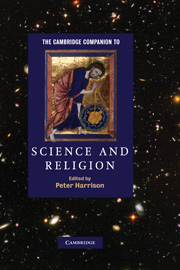Book contents
- Frontmatter
- Introduction
- Part I Historical interactions
- 1 The fate of science in patristic and medieval Christendom
- 2 Religion and the Scientific Revolution
- 3 Natural theology and the sciences
- 4 Religious reactions to Darwin
- 5 Science and secularization
- Part II Religion and contemporary science
- Part III Philosophical perspectives
- A guide to further reading
- Index
5 - Science and secularization
from Part I - Historical interactions
Published online by Cambridge University Press: 28 July 2010
- Frontmatter
- Introduction
- Part I Historical interactions
- 1 The fate of science in patristic and medieval Christendom
- 2 Religion and the Scientific Revolution
- 3 Natural theology and the sciences
- 4 Religious reactions to Darwin
- 5 Science and secularization
- Part II Religion and contemporary science
- Part III Philosophical perspectives
- A guide to further reading
- Index
Summary
In August 2008, anticipating the 200th anniversary of the birth of Charles Darwin, and the 150th anniversary of the publication of his Origin of Species (1859), Richard Dawkins presented on British television three programmes designed to celebrate Darwin's genius. By contrasting Darwin's theory with ideas of creation that he ascribed to religion, Dawkins stressed the originality of Darwin's naturalistic account of how species developed from pre-existing forms. The invocation of a contrasting religious position had a didactic function - to reinforce the viewer's understanding of Darwin's science and its naturalistic presuppositions. A second goal, having many antecedents in the history of science, was to use the theory's supposed implications for religion as a technique for exciting public interest in, and appreciation of, Darwin's achievement. However brilliant the exposition of a scientific theory, without claims that the theory has major implications for something else there has always been the risk of indifference in a general audience. Because of their prevalence, religious beliefs have often, conveniently, constituted that something else. There can be a temptation in such contexts to exaggerate the cultural implications of scientific innovations for the purpose of promoting the science. Dawkins' anti-religious juxtaposition of science and religion does, however, serve a third and explicitly avowed goal - that of persuading those who live in religious darkness that there is a great light.
- Type
- Chapter
- Information
- The Cambridge Companion to Science and Religion , pp. 103 - 124Publisher: Cambridge University PressPrint publication year: 2010
- 13
- Cited by



